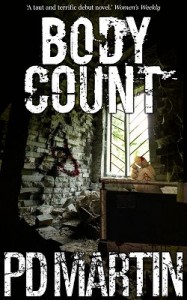August 1, 2013
It’s all about the characters
Filed under: Writing — Tags: character development, characterisation, creating characters — PD Martin @ 7:15 pm
Even now, on my new once-a-month schedule, it seems that blogging comes around so quickly. But that’s more about last month’s blog on the fluidity of time and not today’s!
 Today, I want to talk about characters. You see, I do think different types of books need different levels of characterisation. My Sophie books, as most people reading this know, are what I’d called forensic-based murder mysteries with a good dose of criminal psychology in the form of profiling. They are essentially whodunits and why-dunnit and these two questions are the driving force to keep the readers turning the page. Of course, that doesn’t mean you can ignore character and character development in thrillers or murder mysteries — in fact, readers will quickly put down a book if they don’t feel like they’re connecting to the main protagonist. Characters can never be cardboard cut-outs or two-dimensional. Every character, just like every person, has a story. However, I do think that the importance of characters and the relationships between characters is much more instrumental in novels that explore drama or family dynamics as their central theme and plot.
Today, I want to talk about characters. You see, I do think different types of books need different levels of characterisation. My Sophie books, as most people reading this know, are what I’d called forensic-based murder mysteries with a good dose of criminal psychology in the form of profiling. They are essentially whodunits and why-dunnit and these two questions are the driving force to keep the readers turning the page. Of course, that doesn’t mean you can ignore character and character development in thrillers or murder mysteries — in fact, readers will quickly put down a book if they don’t feel like they’re connecting to the main protagonist. Characters can never be cardboard cut-outs or two-dimensional. Every character, just like every person, has a story. However, I do think that the importance of characters and the relationships between characters is much more instrumental in novels that explore drama or family dynamics as their central theme and plot.
Last year I finished a book that I’d describe as a mainstream drama, not that dissimilar to Jodi Piccoult. And while I finished it last year, it has literally been sitting on my desktop gathering bytes (manuscripts don’t gather dust any more, do they?). Finally, late last year I paid for an assessment/developmental edit. Probably not such a common practice for a published author, but this book was so different to what I’d written before I felt the need to dig deeper and I felt like I needed professional and objective eyes.
But the process didn’t stop there…then I needed to let it stew for a bit. For a lot. I needed to get more objective myself and I needed to go back to the drawing board in terms of characterisation. It’s been an interesting process. Armed with David Corbett’s book, The Art of Character, I started again, as it were. I dug deeper into the characters, deeper into their psychological motivations.
With the new character work complete, I started edited. The editing process is taking me longer than I’d hoped (it always does!), but I’m up to chapter 5 and really happy with the changes in the first four chapters. I feel like I’m transforming this book, and making it so much better in the process.
Good writing is always about characters…but to me it’s about the balance of characters and plot. It’s about knowing when you need character development and when you need something to happen—and preferably you can bring both to the page simultaneously.
It will still be a couple of months before I have another draft to show for this latest spate of work, but already I’m looking forward to seeing the transformation on the remaining 25 chapters. I know I’ve still got a long way to go, but this story is worth the time and the effort.
Originally called Crossroads and Deadends, through my psychological delving I’ve come up with a new title — Adrift. I like it and I hope that one of these days it will make its way to readers.
Comments (1)





